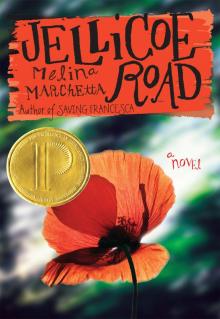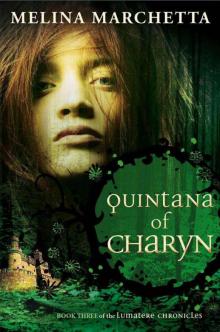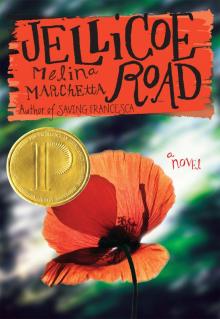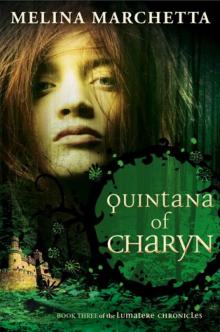- Home
- Melina Marchetta
The Lumatere Chronicles Page 2
The Lumatere Chronicles Read online
Page 2
“‘Dark will lead the light, and our resurdus will rise.’ It’s the ancient word for king, is it not? Resurdus?”
The High Priestess nodded. “The curse was to condemn Lumaterans for allowing the slaughter of her people, but it was also to protect the one she claimed to have seen fleeing from the forest that night. The resurdus. The heir. The dark and light will lead you to him.”
“But where are we supposed to take this . . . child? Evanjalin?” Finnikin asked.
The High Priestess gave a small humorless laugh. “Do you consider yourself a child, Finnikin?”
“Of course not.”
“The novice Evanjalin is nearly your age and left her childhood behind far too early.”
“Where are we to take her, blessed Kiria?” Sir Topher prompted gently.
The High Priestess hesitated. “She claims that the answers lie in the kingdom of Sorel.”
Mercy. Finnikin would have preferred to have heard Sarnak or Yutlind. Even Charyn with its barbaric ways. He would have preferred to take her to hell. It would certainly be less dangerous than Sorel.
“And you believe Balthazar will contact us there?” Sir Topher said.
“I do not know what to believe. The goddess has not bestowed the gift of foresight on me. All I can pass on is this girl and the name of the one she claimed would come for her.” Once again her eyes were on Finnikin. “Perhaps both chosen by a missing king to be his guide.”
There was a sound by the door, and the High Priestess held out her hand as a figure appeared from the shadows.
The girl had the coloring of the Lumateran Mont people, a golden skin tone, much darker than Finnikin’s own fair skin. Her hair was shaved, but he imagined that if it were allowed to grow, it would match the darkness of her eyes. Dressed in a gray shift made of coarse fabric, she would easily be passed by without a second glance.
“Sir Topher, Finnikin, I present to you the novice Evanjalin.”
She cast her eyes down, and Finnikin watched as her hands shook and then clenched.
“What is it you fear?” he asked in Lumateran.
“Most of her time was spent in Sarnak,” the High Priestess explained. “It is the language we have used during the break of silence.”
Finnikin could no longer hold back his frustration. He pulled Sir Topher aside. “We know nothing of her,” he said in Belegonian to ensure the novice and the High Priestess would not understand. “This is all too strange.”
“Enough, Finnikin,” Sir Topher said firmly. He turned back to the High Priestess. “Has she spoken since?”
She shook her head. “She has taken the vow of silence. She has suffered much, Sir Topher, and her faith is strong. It’s the least we can leave her with.”
Sir Topher nodded. “If we are to make the tide, we must leave soon.”
Finnikin was stunned at how swiftly Sir Topher had made his decision, but the look in the older man’s eyes warned him not to protest. Biting his tongue, Finnikin watched as the High Priestess took the girl’s head in her hands and pressed her lips tenderly to her forehead. He saw the girl’s eyes close and her mouth tremble, but then her face became impassive again and she walked away from the High Priestess without a backward glance.
The descent was as nauseating as the climb up, made worse for Finnikin by the burden he carried in his heart. Taking this girl halfway across the land had not been part of the plan he and Sir Topher had worked out in the early days of winter. The uncertainty of their new path did not sit well with him.
When they reached the base of the cliff, they passed the group of kneeling pilgrims. A hand snaked out to grab the cloth of the novice’s cloak.
“Your feet,” Finnikin said, noticing for the first time that she was barefoot. “We can’t afford to be slowed down because you don’t have shoes.”
But the girl did not respond and continued walking. It was only when they were a good distance from the cloister that she looked back and he saw the raw emotion of loss on her face. By then the waters reached their knees and Finnikin feared they would not make it to safety without being washed away. Here, the tide was said to return at amazing speed and pilgrims had drowned without any warning. He grabbed her arm and pulled her forward, and suddenly her look of vulnerability disappeared and in its place was a flash of triumph.
As if somehow the novice Evanjalin had gotten her way.
In the days that followed, cold winds gnawed at their bones and a winter that refused to end kept the days short and darkness a constant companion. Sir Topher decided that the best route to Sorel would be to cross into Sarnak and follow the road through Charyn. Although the quickest route was down through Belegonia, Sir Topher argued that they would not return to Sarnak for at least another year and there was a chance they would encounter survivors from the massacre. On this point Finnikin agreed; it was their destination he could not accept.
“We’re making a mistake,” he said on the third morning, forced now to dress behind a tree. He pulled on his buckskin trousers and then his boots, tucking a tiny dagger next to his calf.
“As you have now mentioned for the tenth time, Finnikin,” Sir Topher called out with maddening patience.
Finnikin had come to appreciate Sir Topher’s patience over the years, ever since he had been placed in his care by Perri the Savage, his father’s second-in-charge. Today, however, there was more irritation than appreciation.
“Sorel,” he muttered as he stepped out from behind the tree. “No one goes to Sorel. No exile would set up camp in Sorel. Not even the people of Sorel want to live in Sorel.”
“Let’s accept our path, Finnikin, and hold our tongue, as the novice does so beautifully,” Sir Topher replied.
The girl did little to lessen Finnikin’s frustration. At night he watched her toss in her bedroll as though possessed by demons, crying, gritting her teeth, calling out with such despair. As they trekked across the flat treeless earth, sometimes her body would slump as if what she dreamed was weighing down her spirit. Other times there was a spring in her step and a soft dreamy smile on her lips, as if she was remembering a moment so happy that it effortlessly carried her over the cold barren land.
Deep down, Finnikin knew there was something more to his unease than this strange girl traveling with them. The mention of the heir had awoken memories, and with them came a restlessness, a sense of futility about the future. In the past ten years, the pages of the dead in the Book of Lumatere had grown. There were those who had been slain in Sarnak, those who had died in a plague village in Charyn, those who had drowned when the floods in Belegonia swept over the river camps. Without their own healers, there were no cures for the ailments that others in the land seemed to easily survive.
When they crossed the border into Sarnak, there was little relief from the weather, but a hot meal was more readily available and Finnikin was glad to be able to leave behind the stale bread and moldy cheese that had been their staple diet for over a week. Trees and shrubs began to appear beside the road, and as they continued east, they found themselves in thick woodland, where they decided to camp.
That night, as Sir Topher pored over the map, Finnikin caught the girl staring at the sword that lay by his saddlebag.
“It’s my father’s,” he said gruffly. He pulled it out of its scabbard. The grip was plain, except for a stone — a ruby, rich and bright — embedded in the handle. As a child, Finnikin had imagined it had powers. He believed anything Trevanion touched did. The novice reached out and placed a finger on the stone.
“The ruby is the official stone of Lumatere. Did you know that?” Sir Topher asked, looking up from his map.
In response, the novice dug her hand deep into her pocket and withdrew a ruby ring. She gently traced its contours, then extended her hand as if offering it to Finnikin to take. When he made no attempt to touch it, Sir Topher reached over and examined it instead. Finnikin could see from the warmth in her eyes that the ring held memories much the same as his father’s sword did. At the t
hought of his father, he was suddenly swamped by a wave of grief. Standing abruptly, he grabbed the crossbow and disappeared into the woods.
Later, Finnikin emerged from the forest with two fair-sized hares. With little fuss, the novice took one of the hares and sat by the fire, cutting into the skin and stripping it from the body of the dead animal with ease. As Finnikin watched, she wiped her brow, leaving a streak of blood across her face. Feeling his gaze on her, she looked up, and in the flickering light of the fire, he saw a fierceness in her eyes that no humble dress or pious look could disguise.
Sir Topher was melancholy that night, and the mead they had secured in the border town had loosened his tongue. Finnikin knew that in this state, Sir Topher would drink and talk. Always about the five days of the unspeakable. Finnikin loved this man dearly and knew he would be dead if not for his mentor’s kindness, but when Sir Topher spoke of those days, Finnikin wanted to shout at him to stick to facts and plans. Facts and plans had results. The days of the unspeakable were impossible to explain or to solve. Finnikin had learned over the years not to think of anything beyond the practicalities of getting from one point to another. To focus on the achievable. Locating a piece of land for the exiles of Lumatere was achievable. But only if they could find a benevolent host, and he knew in his heart that the kingdom of Belegonia was the place. Most of the time Sir Topher agreed, except when he was drinking mead and succumbing to memory.
The girl showed interest in Sir Topher’s story. She put aside the half-skinned hare and kept his words flowing by refilling his cup each time it emptied. Sir Topher relished the opportunity to tell the tale again.
“Does she need to know?” Finnikin asked at one point, not looking up.
“The silence that meets us in every exile camp is a paralysis that has been passed on to the next generation,” Sir Topher said reprovingly.
And so Finnikin heard it again. How the enemy had come in the dead of the night. How they were never able to explain how the assassins had managed to get past the guards, for it was only five days later that the kingdom gates became impenetrable, and questions stayed unanswered. Some said the assassins were in Lumatere long before that night, hiding and plotting to sweep through the palace and take the lives of every single inhabitant: the cooks, the guards, the ladies-in-waiting, the pages, the nursemaids, the groundsmen. Sir Topher had been sent to Belegonia with the ambassador on palace business and had lived with the guilt of surviving ever since.
It was Trevanion, captain of the King’s Guard and Finnikin’s father, who made the gruesome discovery. At the second change of guard, he returned and found the first man dead at the palace entrance. A path of bodies led to the grand hall where the king, queen, and three older princesses were found slain. A desperate search for Balthazar and Isaboe followed. Balthazar alive meant the survival of Lumatere. It meant that no stranger would dare enter the kingdom and claim it as theirs. The King’s Guard searched every house in the palace village, every square inch of the Flatlands, crossed the mountains, searched the Rock Village, and scoured the caves. Finally, they left the confines of the kingdom walls and there they saw it, in the cold light of the rising sun. A small bloody handprint on the outside wall of their fortress. As if Balthazar had been hammering all night long to reenter a world that had already ceased to be.
Sir Topher stopped speaking, and Finnikin looked up. As always, there were tears on the face of the king’s First Man as he relived the horror of what they found in the Forest of Lumatere that day. Limbs and flesh, clumps of hair, and finally the blood-soaked clothing of the youngest princess, Isaboe.
The novice Evanjalin barely seemed to breathe. Her hands were clasped under her chin as if in prayer, but unlike Finnikin, who could not bear to hear more, her eyes begged Sir Topher to continue.
“In the Forest of Lumatere lived the worshippers of Sagrami, the goddess of night,” Sir Topher said, composing himself. “In centuries past they were persecuted and forced to live outside the kingdom walls. Many were healers, mystics, and empaths, with gifts that could not be explained, but over the years, they had begun to work and live among their fellow Lumaterans again.
“The matriarch of the Forest Dwellers was a powerful woman named Seranonna. She was once the wet nurse to the queen, and there was a bond between them that the king honored for the love of his wife.
“But on the morning after the slaughter, Seranonna was found with her hands and clothes soaked with blood. Grief-stricken Lumaterans said it belonged to the youngest princess, that somehow the Forest Dwellers were involved in a sacrifice using the blood of the royal children. The Forest Dwellers claimed that at least two of their people had seen Balthazar running through the forest that night, and that in her search for him, Seranonna had found the remains of Isaboe and tried to gather up the pieces. It was for this reason, they swore, that Seranonna had the blood of the child stained in the lifelines on the palms of her hands.
“But the villagers would not listen. Their king was dead. A king directly descended from the gods. His beloved queen of the Mont people dead. His beautiful daughters raped, slaughtered. His youngest daughter torn to shreds. His son, the heir, missing. His palace guards and people slain. And so the Lumateran people rounded up all those who worshipped Sagrami within the kingdom walls and burned down their homes, forcing them out into the Forest of Lumatere with the rest of their people. Neighbors fought neighbors. Cattle were slaughtered. Crops were burned. It was a world gone mad.”
Finnikin had watched it all from the Rock Village, clutched in the arms of his great-aunt Celestina. “It’s the end of the world, Finnikin,” she had chanted. “The end of the world.”
“On the second day, the king’s cousin rode into Lumatere with six hundred men, most of them Charynites,” Sir Topher continued. “He had been serving in the Charyn court for almost ten years. With the blessing of the remaining rulers of Skuldenore, who were desperate to keep peace in the region, he was appointed the new king of Lumatere.
“The impostor’s first decree? Any worshipper of the goddess Sagrami was to be put to death for treason. Those known for practicing dark magic were to be burned at the stake. The Lumateran people were horrified. There was a difference between running the worshippers of Sagrami out of their homes and killing them. But they stood and watched what they had started. One by one over the next three days, men, women, and children were slaughtered, burned in their homes in the Forest of Lumatere. Until the people of Lumatere dreamed crimson dreams and could not walk out of their own homes for the stench of death that blew over their kingdom.”
The novice closed her eyes, even covered her ears for a moment. Finnikin knew there were parts of this story she may never have heard before. No one spoke of those days in any of the exile camps he and Sir Topher visited. Their guilt and despair kept them silent.
“Lumaterans began to leave in droves,” Sir Topher went on. “The Monts, the queen’s people, had already left, gathering every one of their kin and moving them to the safety of the Valley of Tranquillity, outside the kingdom walls, to wait. The noblemen and women of the Flatlands joined them, fearing they would be next on the impostor’s list. Some convinced those in their villages to travel with them. The elders of the Rock Village forbade their people to leave. Strategically, they were the safest, perched high, overlooking the whole kingdom. Many of the River clans followed their Flatland neighbors, while others traveled up the river to Sarnak to seek refuge there until the trouble subsided. By the end of the third day, more than half of Lumatere could be found outside the kingdom walls, either in the Valley of Tranquillity or in Sarnak.
“The next day, the captain of the King’s Guard was called forward to swear allegiance to the new king. In Lumatere, tradition dictated that all should kneel in the presence of the king. Except for the King’s Guard. Since the time the gods walked the earth, the King’s Guard of Lumatere would lie prostrate at the feet of their leader when first in his presence.
“That day, Captain Trevanion ref
used. It was his belief that the impostor’s hands were soaked with the blood of the innocent. And in revenge for the disrespect shown by the captain, the impostor king’s men arrested Lady Beatriss, accusing her of treason aided by Trevanion. You see, on the night of the royal murders, the only palace dweller to survive was Beatriss, lady-in-waiting to the princesses. How did she survive such carnage? the impostor king asked. How did the assassins enter a guarded palace if not through the captain of the King’s Guard? Of course, deep down, the people of Lumatere did not believe that Beatriss and Trevanion had had anything to do with the murders, but by then everything was in turmoil.
“In front of Trevanion,” Sir Topher said, “they tortured her. I heard her screams. They tortured her until Trevanion confessed to treason, confessed to anything, for he knew they would come for his son next.”
Finnikin clenched his fist, his fingernails digging into his palms. He watched the novice flinch as if she felt the impact of his nails herself.
“Beatriss was sentenced to death, Trevanion exiled. Some say the king of neighboring Belegonia intervened to save Trevanion’s life. But others had a different theory. They thought the impostor king feared an uprising by Trevanion’s men. He knew that while their captain was still alive, they would not act.”
Finnikin busied himself with cleaning the crossbow. He tried not to think of what took place after his father was taken away. At times it felt like a blur, while other times he remembered it with complete clarity.
“On the fifth day, they dragged Seranonna into the town square. She was the last of the Forest Dwellers to be put to death, and there was talk that Lady Beatriss would be hanged next. Seranonna’s clothes and hands were soaked with blood. Some believed it belonged to the dead child she had delivered of Lady Beatriss in the palace dungeon. Others said it was still Isaboe’s blood.
“I was there in the crowd,” Sir Topher told the girl. “My king always believed we should not turn our backs on our people as they suffered. I don’t think anyone understood the rage Seranonna felt for what had been done to her people. Nor did they understand the extent of her grief for the queen and the royal children.”

 Froi of the Exiles
Froi of the Exiles Finnikin of the Rock
Finnikin of the Rock On the Jellicoe Road
On the Jellicoe Road The Piper's Son
The Piper's Son The Place on Dalhousie
The Place on Dalhousie Quintana of Charyn
Quintana of Charyn The Lumatere Chronicles: The Complete Trilogy
The Lumatere Chronicles: The Complete Trilogy What Zola Did on Tuesday
What Zola Did on Tuesday Tell the Truth, Shame the Devil
Tell the Truth, Shame the Devil Looking for Alibrandi
Looking for Alibrandi What Zola Did on Monday
What Zola Did on Monday Froi of the Exiles lc-2
Froi of the Exiles lc-2 Review of Australian Fiction, Volume 3, Issue 4
Review of Australian Fiction, Volume 3, Issue 4 Jellicoe Road
Jellicoe Road Froi of the Exiles: The Lumatere Chronicles
Froi of the Exiles: The Lumatere Chronicles Quintana of Charyn lc-3
Quintana of Charyn lc-3 Finnikin of the Rock lc-1
Finnikin of the Rock lc-1 The Lumatere Chronicles
The Lumatere Chronicles